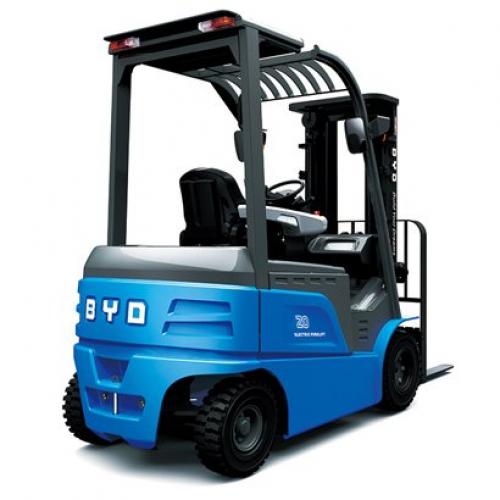Whether you’re thinking of buying an electric forklift, hiring an electric forklift, or you’re just curious, in this short article, we answer 5 of the most common questions people ask about these wonderful machines.
If you find the article helpful, please give it a share, to help anyone else that might want to know more about electric forklifts, and if you’d like to investigate further, get in touch with Beds & Bucks Forktrucks Ltd., and we’ll be happy to help.
Yes, you can use an electric forklift outside, but… it must have an IP54 rating. An IP54 rating basically means the vehicle is designed with protection against dust, debris and liquid, which includes rain and other moisture from outside. But, if your forklift is predominately used outside, we’d still recommend you choose a petrol, diesel or LPG model.
No, you definitely can’t use a car battery for an electric forklift. An electric forklift relies on a ‘deep cycle’ battery, known by some as ‘marathon runners’ in the world of batteries.
Unlike a car battery, a deep cycle battery is able to be charged repetitively, and will provide sustained power over a long period of time.
When it comes to charging your electric forklift, depending on your shift patterns, there are three methods, each of which includes connecting the battery to a power supply via a specialised charging unit, and include:
Conventional charging: This is where you simply plug into the mains, via a compatible charger, and leave it for around 8 hours.
Note: The battery may need cooling after this process.
Opportunity charging: This type of charging is done during shift breaks, or other ‘opportune’ moments, with a specialised charging unit, which delivers a high current (20-30 amps per 100 amp hours) to the battery, allowing you to get the charge you need, in the fastest time possible.
Fast charging: Fast charging is very much like opportunity charging, but the specially designed fast-charging unit delivers a slightly higher rate of charge.
Just like a diesel, petrol or LPG forklift, the speed will be dependent on the weight of the load it’s carrying, but the legal limit for any forklift in a working environment is 8mph, making the overall speed irrelevant.
At present, the upper lifting capacity of an electric forklift is around 125,000 lbs. If you need to lift more than this maximum weight, we’d recommend a diesel or petrol model, especially if you require the forklift to work over long shifts.
This short article provides brief answers to each of the common questions asked about electric forklifts. To find out more, we’d always suggest speaking to a reputable forklift specialist, prior to deciding which forklift to buy, whether it’s electric, diesel, petrol, or LPG.
Whether you’re looking for new forklifts, used forklifts or forklift servicing, contact Beds & Bucks Forktrucks Ltd. today. We have a huge range of top brand forklifts available, plus all the resources and information you need to ensure you choose exactly the right forklift for the job.


